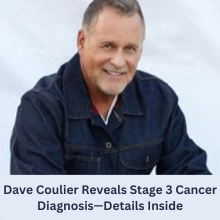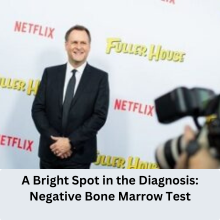
Dave Coulier, known for his iconic role as Joey Tanner on the beloved show Full House, has shared some tough news with the world: he’s been diagnosed with stage 3 Non-Hodgkin lymphoma. But instead of shying away from his diagnosis, Coulier is choosing to face it head-on and use his platform to raise awareness about cancer. Here’s a look at his journey, the challenges he’s faced, and the lessons he’s learned along the way.
Dave Coulier’s Health Journey: From a Cold to Cancer Diagnosis
It all started with what seemed like a simple head cold. Coulier had been dealing with an upper respiratory infection, but things began to escalate quickly. The swelling in his lymph nodes became more pronounced, and soon one area was as large as a golf ball. Concerned about the rapid progression, Coulier sought medical attention, and his doctor ordered a series of scans—PET and CT—along with a biopsy.
The Diagnosis: Stage 3 Non-Hodgkin Lymphoma
Just days after the scans, Coulier received the news that would change his life forever. His doctors delivered a devastating diagnosis: stage 3 Non-Hodgkin lymphoma, specifically B-cell lymphoma. To make matters more challenging, it was an aggressive form of cancer.
Coulier recalls the shock he felt upon hearing those words. “I went from, I got a little bit of a head cold to I have cancer, and it was pretty overwhelming,” he admits. For many, this kind of rapid change can be paralyzing. But Coulier didn’t let the diagnosis define him.
First Steps in Fighting Cancer: The Power of Support
In the face of such a daunting diagnosis, Coulier didn’t have to go it alone. His wife, Melissa Bring, and a close-knit circle of friends in the medical field rallied around him. Together, they quickly devised a plan to attack the cancer head-on. “We all kind of put our heads together and said, ‘Okay, where are we going?’” he recalls.
One positive note in an otherwise difficult situation was the result of a bone marrow test. When the results came back negative, Coulier’s doctors gave him a better prognosis: his chances of a full recovery went from low to about 90%. This shift brought Coulier a sense of relief. It was a small but significant victory in a journey that would soon prove to be a battle.
A Bright Spot in the Diagnosis: Negative Bone Marrow Test
While the cancer diagnosis was tough, Coulier’s doctors saw a glimmer of hope when his bone marrow test came back clean. For many cancer patients, the bone marrow is an early indicator of how aggressive the disease might be. With his test results showing no signs of cancer in the bone marrow, his doctors gave him a much more optimistic view.
In fact, this news raised his chances of being cured to around 90%. It was a game-changer for Coulier, and he embraced it with open arms. “At that point, my chances of curable went from something low to 90% range. And so that was a great day.”
Chemotherapy Begins: Preparing for the Battle
The next step in Coulier’s journey was chemotherapy. He began treatment just two weeks after his diagnosis, marking the start of what would be an intense and emotional rollercoaster.
Before the chemotherapy started, Coulier made the decision to shave his head—a symbolic move, signaling that he was ready to face the battle ahead. “I started the podcast by wearing a hat and saying I’ve always been a person who wears many hats, but this hat has a special significance,” he said. It was a powerful statement of courage and strength.
Opening Up: Sharing His Cancer Journey Publicly
In a brave and personal move, Coulier decided to publicly share his cancer journey. He opened up about his diagnosis on his podcast, Full House Rewind with Marla Sokoloff. “I’m going to meet this head-on, and I want people to know it’s my life,” he explains. By speaking openly about his illness, Coulier hoped to inspire others to face their own struggles with the same level of honesty and bravery.
The Emotional Impact of Cancer: Keeping a Positive Outlook
Cancer doesn’t just affect the body; it takes a significant toll on the mind and emotions. For Coulier, staying positive was key—not just for his own well-being but also for his wife and their son. He was determined to remain strong for them, especially for his wife, who was going through her own emotional rollercoaster.
“I saw how those words affected [Melissa], and I thought, you know, I’m going to stay strong during this, not only for me, but I… strong for her,” Coulier says.
Inspiration from Family: A Legacy of Strength
Coulier’s family has played a significant role in his ability to stay strong. Sadly, many of his family members have also fought cancer. He lost his mother to breast cancer, his sister Sharon at just 36 years old, and his niece, Shannon, who was only 29 when she passed. But instead of feeling defeated, Coulier found strength in their resilience.
“I saw what those women in my family had to go through, and I thought to myself, ‘If I could be just 1/10 percent as strong as them, I’m going to be just fine,” he reflects.
Also read: Bitcoin Hits $90K! US Inflation Report & DOGE’s New Leaders
Humor as a Healing Tool: A Shared Sense of Humor with His Sister
One of the things that has kept Coulier going throughout his cancer journey is humor. He credits his sister, Karen, who has worked as a registered nurse, for helping him find laughter even in tough times. The two siblings share a unique bond, and they’ve often used humor to lighten the mood during their cancer battle. “In four weeks, I’ve gone from Virgo to Cancer,” Coulier jokes. I thought, ‘I finally made it to the NHL!’”
Coulier’s Perspective on Life After the Diagnosis
Cancer has a way of changing everything—especially how you view life. For Coulier, receiving his diagnosis led to a deep sense of calm and acceptance. “I found myself remarkably calm with whatever the outcome was going to be,” he says. It was as though the challenges his family members had gone through prepared him for this moment. He’s found peace in the uncertainty.
Staying Active During Treatment: Maintaining Quality of Life
Despite the toll chemotherapy takes on his body, Coulier has made it a point to stay active. On good days, when the steroids give him a boost of energy, he’s been out skating with friends in Detroit—a favorite hobby he’s unwilling to give up. Staying active helps him stay grounded and connected to the things he loves.
Preparing for Grandfatherhood: A New Chapter in Life
A particularly bright spot in Coulier’s life right now is the arrival of his first grandchild. His son Luc and daughter-in-law Alex are expecting a baby boy in March, and Coulier can’t wait to become a grandfather. “I’ve got to teach him how to play hockey,” he jokes. The anticipation of this new chapter in his life is something he’s holding onto tightly.
Advice to Others: Early Detection and Regular Check-ups
One of the most important messages Coulier wants to share is the significance of early detection. His cancer was found early enough to give him a good chance of survival, but not everyone is so fortunate. “Take great care of yourself, because there’s a lot to live for,” he urges. Whether it’s regular check-ups, screenings, or self-exams, staying on top of your health can make all the difference.
Also read: Why ChatGPT Is Down & When the ‘Bad Gateway’ Error Will Be Fixed
FAQs
-
What is Non-Hodgkin lymphoma?
- Non-Hodgkin lymphoma is a type of cancer that affects the lymphatic system, part of the body’s immune system. It occurs when abnormal lymphocytes (a type of white blood cell) grow uncontrollably.
-
What is B-cell lymphoma?
- B-cell lymphoma is a subtype of Non-Hodgkin lymphoma. It originates in B-cells, which are responsible for producing antibodies that help the body fight infections.
-
What is the prognosis for someone with stage 3 Non-Hodgkin lymphoma?
- The prognosis for stage 3 Non-Hodgkin lymphoma depends on various factors, including the type of lymphoma, how quickly it’s treated, and the patient’s overall health. However, many people achieve remission with appropriate treatment, like chemotherapy.
-
How does chemotherapy work for cancer patients?
- Chemotherapy uses powerful drugs to kill cancer cells or stop them from growing. It can be administered in different ways, including intravenously or orally, and typically involves multiple rounds of treatment.
-
What advice does Dave Coulier have for people facing cancer?
- Coulier encourages people to stay positive, lean on family and friends for support, and make sure to undergo regular check-ups and screenings. He stresses the importance of early detection in improving outcomes.

